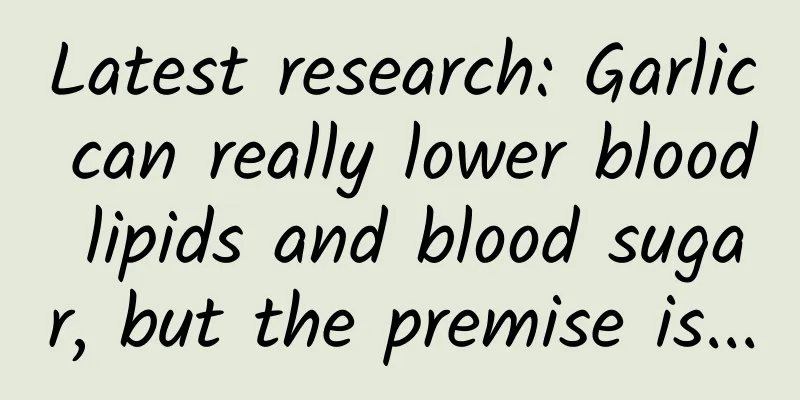Latest research: Garlic can really lower blood lipids and blood sugar, but the premise is...

|
Recently, a new study has been circulated online, which has been reported by many media outlets. What is the nutritional value of garlic? Can it really lower blood sugar and cholesterol? Related report screenshots Garlic can lower blood sugar and blood lipids Is the research true? The claim that garlic can lower blood sugar and cholesterol is not new . It should have been around in the 1980s and has continued to emerge over the past few decades. The so-called latest study on the Internet is a study by Southeast University and Tibet University for Nationalities in my country. The researchers analyzed 22 studies that met their criteria, including 29 trials, for a meta-analysis. These trials involved a total of 1,567 participants from different countries and age groups. Trials needed to use garlic as an intervention for more than 2 weeks and report HbA1c, fasting blood glucose, total cholesterol, HDL-C, LDL-C, and triglycerides. In various trials, researchers administered garlic in the following forms: garlic, garlic oil, aged garlic extract, garlic powder pills or tablets, garlic extract capsules, and raw garlic. Copyright images in the gallery. Reprinting and using them may lead to copyright disputes. Depending on the trial, some participants took between 300 and 22,400 milligrams (mg) of garlic powder per day, while others took between 800 and 4,200 mg per day. The results found that garlic supplementation reduced fasting blood sugar levels, glycated hemoglobin, total cholesterol, and low-density lipoprotein cholesterol — also known as "bad cholesterol." Therefore, there are statements on the Internet such as "The latest research finds that garlic can lower blood sugar and cholesterol" and "Garlic may be the secret weapon to lower blood sugar and cholesterol". What do you think of this research? So, can garlic really lower blood sugar and cholesterol? How should we view this research? This study is a systematic review and meta-analysis study. From a research perspective, the level of evidence is still very high, and the results found are still very good . It can be shown that eating garlic is still good for health. However, this study also has some shortcomings, which makes it of little guiding significance for our daily diet. First, it is a meta-analysis, but the overall number of people covered is still relatively small , only more than 1,500. Secondly, this study did not use the method of eating garlic directly, but mainly analyzed garlic supplements. There are different types of garlic supplements, such as garlic powder, garlic oil, aged garlic extract, raw garlic and enteric-coated garlic supplements, etc. The content of the active ingredients in different types of garlic supplements cannot be directly compared because they differ in active ingredients and bioavailability. In addition, the amount of garlic supplements examined in different trials also varies greatly . For example, the amount of garlic powder used in some studies is 22,400 mg/day, which is equivalent to about 70-90 grams of fresh garlic . In daily life, it is difficult for people to eat so much fresh garlic. After all, most people use garlic as a seasoning, just adding two cloves when cooking to add a little flavor. Moreover, eating too much is not good. Bad breath is a small matter. Eating too much garlic will cause gastric acid secretion and irritate the gastrointestinal mucosa . Therefore, from this study, we can conclude that eating garlic is still good for health, but we should not expect that the garlic we eat on a daily basis can lower blood sugar or cholesterol . Diabetic patients and people with high blood lipids should not give up the medication they should continue just because they believe its claims. How to correctly understand What are the benefits of garlic? In addition to lowering blood sugar and cholesterol, garlic has many other health-preserving functions in folk culture, including cancer prevention, antibacterial, blood pressure reduction, and prevention of cardiovascular diseases. The saying that "eating more garlic can improve health" has always been deeply rooted in people's minds. Garlic and "garlic products" and "garlic extracts" are almost a cure-all in many people's minds. Is garlic really that magical? In fact, there are many studies analyzing these claims, but some tests have not been passed, some are still controversial, and many experiments are only the results of cell or animal experiments, which cannot be simply applied to humans. Moreover, the experiments used large doses of extracts, and the few cloves of garlic we usually eat will not have any effect at all . Therefore, you should not expect to prevent diseases or strengthen your body by eating garlic. Garlic is a vegetable that is good for everyone to eat normally, but you should not be superstitious about its health-preserving function, and you should not stop taking medicine or medical treatment because of it . Garlic is a common vegetable in daily diet, usually used as a seasoning vegetable. From the nutritional analysis, 100 grams of edible garlic contains 26.5 grams of carbohydrates, 0.2 grams of fat, 4.5 grams of protein, and 1.1 grams of dietary fiber, which is considered a seasoning vegetable with good nutritional value. However, eating too much garlic will promote gastric acid secretion and irritate the gastrointestinal mucosa. It is recommended that you do not eat too much, especially those with gastric ulcers and excessive gastric acid . References [1] Chi MS, Koh ET, Stewart TJ. Effects of garlic on lipid metabolism in rats fed cholesterol or lard. J Nutr. 1982 Feb;112(2):241-8. doi: 10.1093/jn/112.2.241. PMID: 7057262. ↑ [2] Gu Yue. Effects of garlic oil on cholesterol and blood sugar: the hypoglycemic effect is statistically significant [J]. Foreign Medical Information, 1982(1). ↑ [3] Zhao, X.; Cheng, T.; Planning and production Author: Ruan Guangfeng, Deputy Director of Kexin Food and Health Information Exchange Center Review丨Zhang Yu, researcher/PhD, Chinese Center for Disease Control and Prevention, national health science expert Planning丨He Tong Editor: He Tong Proofread by Xu Lailinlin |
<<: Hepatic encephalopathy is not scary! Uncover the causes and find ways to deal with it
>>: All about Varicocele Surgery
Recommend
What is the reason for the pain on the left side of the girl's lower abdomen?
Girls often complain of lower abdominal pain, esp...
What are the benefits of eating scallops? How to eat scallops safely
People who love seafood must know about dried sca...
If a woman's area turns black, her husband will definitely hate it
The weather is hot in summer, and the skin is pro...
What happened when there was a sudden power outage at home? Things to note when there is a power outage in summer
If a power outage suddenly occurs in your life, y...
What does pH value mean in leucorrhea test?
Some people describe women's discharge as a w...
What is the difference between fish cake and fish tofu? How to make fish tofu
Some friends are very curious and want to know wh...
What to do if you don't want a baby after one month of pregnancy
Normal intrauterine pregnant women, gestational p...
Is it pregnancy if your period exceeds a few days?
If your period is delayed for a few days, there i...
Contraceptive success rate of withdrawal bleeding
If a woman has withdrawal bleeding after taking b...
Is it okay to have sex 20 days after an abortion?
As the quality of life continues to improve, pass...
What are the signs of ectopic pregnancy? We must learn to make correct judgments in the future
After a woman has an ectopic pregnancy, it is the...
What is the phenomenon of early abdominal pain in pregnant women
Pregnant women will cause a series of problems in...
What should I do if anti-endometrial antibodies are positive?
Protecting the physical health of modern women is...
What to do if you have itching below during confinement
For new mothers who have just given birth, confin...
Can I use moxibustion during the dog days? What is the best time to use moxibustion during the dog days?
Moxibustion, also known as moxibustion therapy or...









